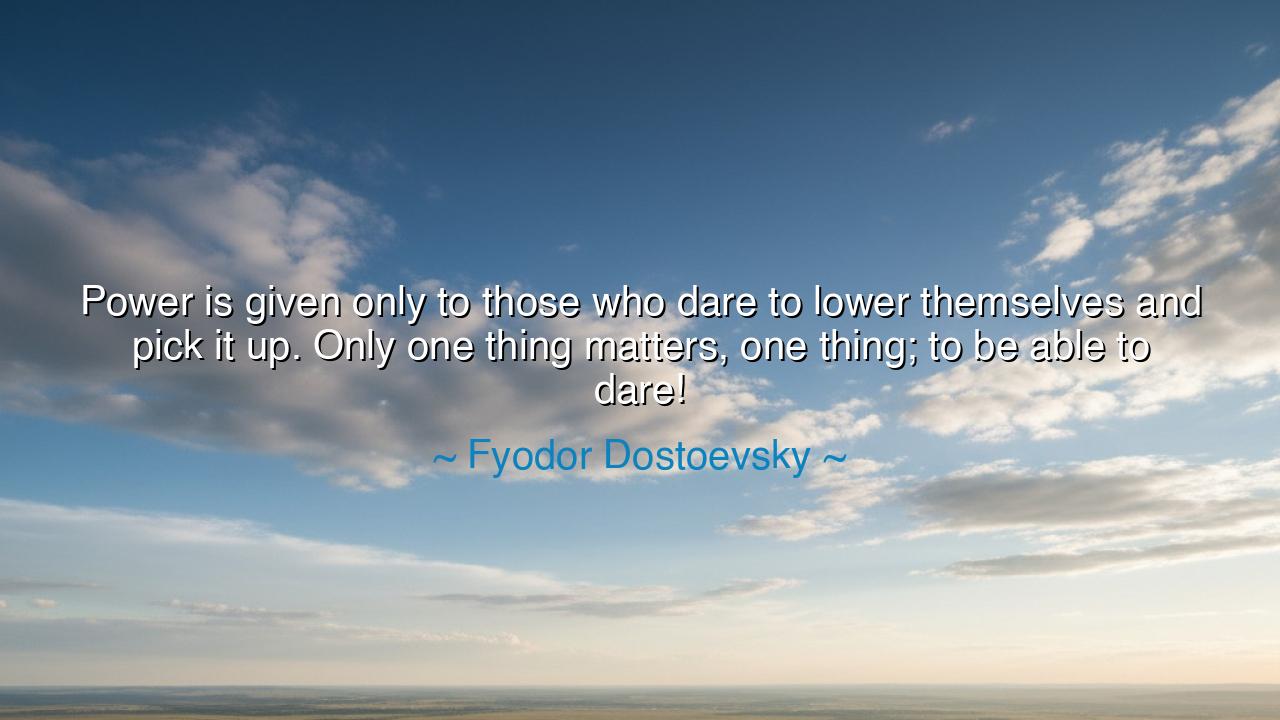
Power is given only to those who dare to lower themselves and
Power is given only to those who dare to lower themselves and pick it up. Only one thing matters, one thing; to be able to dare!






Power does not descend from the heavens like a divine gift; it must be seized by those who have the courage to claim it. When Fyodor Dostoevsky declared, “Power is given only to those who dare to lower themselves and pick it up. Only one thing matters, one thing; to be able to dare!” he revealed the eternal truth that courage, not birthright or fortune, is the true path to authority. Power lies scattered upon the earth, waiting for hands bold enough to grasp it. But to reach it, one must lower themselves, humbling their pride, enduring hardship, and risking scorn. It is the daring heart that transforms fate.
This teaching rises from the depths of Dostoevsky’s own life and the turbulent history of his homeland, Russia. Living through oppression, poverty, and imprisonment, he understood that those who seek power must descend into the muck of human struggle. To “lower oneself” is to embrace toil, humiliation, and sacrifice, for power is never gained by the timid or the comfortable. It is born in the crucible of risk and suffering, where only the strongest spirits emerge victorious. In Dostoevsky’s world, daring was not merely ambition—it was survival.
History echoes this truth. Consider Napoleon Bonaparte, who rose from a modest Corsican background to command the armies of France. Many men of noble birth looked down on him, but Napoleon dared where others hesitated. He endured scorn, hardship, and battle, lowering himself to the trenches before rising to the throne. His meteoric rise was not due to destiny alone, but to his audacity—his willingness to act boldly when others faltered. Though his later downfall serves as a warning against hubris, his ascent illustrates Dostoevsky’s lesson: power favors the daring.
To dare is also to confront one’s inner fears. Many are offered chances to rise, yet they falter, paralyzed by doubt or bound by comfort. They wait for ideal conditions, failing to see that opportunity must often be seized in imperfection, amidst chaos and danger. The one who hesitates watches power slip away into the hands of those less worthy but more courageous. Thus, the act of lowering oneself is not merely physical, but spiritual—a surrender of pride and fear in pursuit of something greater.
This truth is not limited to rulers and generals. In every realm of life, from art to invention, greatness belongs to those who dare. Galileo Galilei, facing the might of the Church, lowered himself before tribunals and humiliation, yet dared to proclaim that the Earth moves. His courage reshaped the human understanding of the universe. Like the warrior on the battlefield, the thinker too must stoop and grasp the heavy weight of truth, knowing the cost it demands.
Let this teaching thunder through the ages: power is not a gift, it is a conquest. It belongs to those who are bold enough to bend low, to dirty their hands, and to risk everything. The timid will remain spectators, forever ruled by the daring few. Remember Dostoevsky’s words: there is but one thing that matters—to dare. For in daring, one shapes destiny itself.






AAdministratorAdministrator
Welcome, honored guests. Please leave a comment, we will respond soon